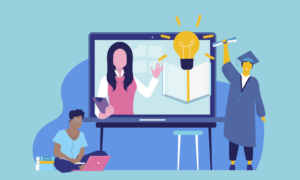What is Open Pedagogy?
Open pedagogy is a scholarship practice different from the traditional mode of teaching and learning. It involves students and instructors creating and sharing knowledge in an active process. Unlike the traditional pedagogical approach, whereby students are considered the passive recipients of teaching, Open Pedagogy sees them as co-creators in the knowledge-making process. This shift in concept invites greater student empowerment with students taking ownership of their learning, while also being more inclusive and collaborative. For the educators, this opens up new pathways to dynamically tailor content based on shared and openly licensed resources, enhancing creativity and adaptability in teaching.
Role and Impact of OER
Open Educational Resources transform education through high-quality, openly available learning materials, making knowledge accessible to all. It removes barriers in learning with cost, and thus OER would guarantee equal opportunity in education. Applying this to my own studies, this could reduce some of the monetary stress associated with textbooks and provide resources that are flexible and tailored precisely to meet my needs as a learner. It also promotes accessibility: resources could be adapted for different learning styles or languages. Thus, OER has great potential to democratize education much more, providing universal access to quality materials which otherwise would be limited due to costs or availability.
Trends of OER in the Global Perspective
Globally, the adoption of OER is increasingly growing. Governments and institutions of learning are increasingly availing support to facilitate its integration into the system. Among the current trends in the global setting is the creation of policies that enforce or encourage the adoption of OER, reducing costs in education and enhancing resource accessibility. OER seems to hold a great promise in poorer countries-for quality materials that could be provided without the hassle and expense of textbooks. But problems remain, among which are the inclusion of cultural relevance and the search for funds for the creation and maintenance of resources. This new trend of international collaboration towards the development of OER presents new opportunities for knowledge exchange across borders and a chance for greater inclusiveness in education worldwide.
Understanding Creative Commons Licensing
 CC Licensing allows for responsible use, adaptation, and sharing of OER. With knowledge of CC licenses, one would know how to legally and ethically integrate various materials into their work, having full insight into how resources may be adapted, shared, or attributed. For instance, if I want to reuse an openly licensed image or textbook in some project, a CC-BY license would allow me to remix and share the work as long as I give proper attribution. That freedom in licensing is invaluable in creating inclusive, and customized resources for all manner of diverse educational needs.
CC Licensing allows for responsible use, adaptation, and sharing of OER. With knowledge of CC licenses, one would know how to legally and ethically integrate various materials into their work, having full insight into how resources may be adapted, shared, or attributed. For instance, if I want to reuse an openly licensed image or textbook in some project, a CC-BY license would allow me to remix and share the work as long as I give proper attribution. That freedom in licensing is invaluable in creating inclusive, and customized resources for all manner of diverse educational needs.
Characteristics of Open Pedagogy
Open pedagogy are collaborative, transparent, and student-centered learning processes that promote inclusivity and collective knowledge construction. These, therefore, are some attributes I could bring into my own practice: in group projects where findings are shared openly and all materials are adapted for our own use, peer-to-peer feedback is being fostered. Not only does this method make me more deeply knowledgeable, but it also instills a sense of agency and responsibility in me for the learning community. Open pedagogy refers to the practice of making the process of teaching and learning

transparent and open for view, benefiting a connected and participatory education ecosystem where students and instructors constantly contribute to and learn from.
Comments
3 Responses to “Blog post #4”
I appreciate your thoughts on Open Pedagogy and OER. I agree that Open Pedagogy empowers students to take ownership of their learning, fostering a collaborative environment. The potential of OER to make education more accessible, especially in areas with high textbook costs, is significant. I also agree that Creative Commons licensing is key to effectively using and sharing OER materials. As a biochemistry student, I see how OER could provide more accessible, high-quality resources, promoting global collaboration. Your post highlights the importance of these trends in creating a more inclusive educational system.
I agree with your insights on Open Pedagogy and how it empowers both students and educators by encouraging co-creation and collaboration. This shift away from traditional teaching helps students take ownership of their learning. Your points on OER are important, especially in how they make education more accessible and customizable. The flexibility of OER, combined with Creative Commons licenses, supports responsible sharing and adaptation of resources. This helps create an inclusive learning environment. I also appreciate how you connected these ideas to Universal Design for Learning. Prioritizing accessibility and inclusivity ensures all students have an equal opportunity to succeed, which aligns with the goals of Open Pedagogy and OER.
I agree with Hannahs definition of open pedagogy. I appreciate how she highlighted the how open pedagogy promotes inclusivity! I also think I personally can bring into my own educational practices as material in group projects are shared amounts our group. I think that engaging in course work creatively is very important for the outcome of knowledge. It allows for a more diverse and accessible learning strategy that strives to encourage engagement and creativity! Very well explained Hannah!